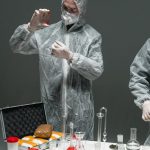Pure Cocaine: Prague’s Clean Choice
Prague, the capital city of the Czech Republic, is known for its rich history, cultural landmarks, and vibrant nightlife․ However, in recent years, the city has also gained a reputation for its high-quality and pure cocaine․ This article will delve into the world of cocaine in Prague, exploring the reasons behind its reputation and the implications of this trend․
Cocaine is a highly addictive and powerful stimulant that has been a part of Prague’s nightlife scene for decades․ However, in recent years, the city has seen a surge in the availability of high-purity cocaine, which has become a sought-after commodity among locals and tourists alike․ The reasons behind this trend are complex and multifaceted, involving factors such as globalization, economic growth, and changes in drug trafficking patterns․
Reasons Behind Prague’s Pure Cocaine
So, why is Prague’s cocaine considered to be of such high quality? Several factors contribute to this reputation:
- Geographic location: Prague’s strategic location in the heart of Europe makes it an ideal hub for drug trafficking․ The city’s proximity to major ports and borders allows for easy transportation and distribution of cocaine․
- Globalization and trade: The Czech Republic’s membership in the European Union and its participation in international trade agreements have facilitated the flow of goods, including illicit substances like cocaine․
- Economic growth and demand: Prague’s growing economy and increasing wealth have created a demand for high-quality cocaine among the city’s affluent population․
Implications of Pure Cocaine in Prague
The availability of high-purity cocaine in Prague has significant implications for the city’s residents, visitors, and authorities․ Some of the concerns include:
- Increased addiction and health risks: The high purity of cocaine in Prague increases the risk of addiction and health problems, including overdose and long-term damage to the brain and body․
- Crime and corruption: The cocaine trade is often linked to organized crime and corruption, which can have far-reaching consequences for the city’s safety and governance․
- Social and economic impacts: The demand for cocaine can also have social and economic impacts, including the exploitation of vulnerable populations and the diversion of resources away from legitimate economic activities․
Efforts to Combat the Cocaine Trade
The Czech authorities have been working to combat the cocaine trade in Prague, with a focus on disrupting supply chains and reducing demand․ Some of the measures include:
- Increased surveillance and intelligence gathering: The police have been using advanced technology, such as CCTV cameras and social media monitoring, to gather intelligence on cocaine trafficking networks․
- Collaboration with international partners: The Czech Republic has been working closely with other European countries and international organizations, such as Europol and Interpol, to share intelligence and best practices in combating the cocaine trade․
- Public awareness campaigns: The government has been running public awareness campaigns to educate people about the risks and consequences of cocaine use, as well as the importance of reporting suspicious activity․
Support for Addicts and Vulnerable Groups
In addition to law enforcement efforts, the Czech government has also been providing support for addicts and vulnerable groups, including:
- Drug treatment and rehabilitation programs: The government has been investing in drug treatment and rehabilitation programs, including counseling, therapy, and medication-assisted treatment․
- Social services and support: The government has also been providing social services and support, such as housing, employment, and education, to help addicts and vulnerable groups reintegrate into society․
- Community outreach and engagement: Community outreach and engagement programs have been established to raise awareness about the risks of cocaine use and to provide support and resources to those affected by addiction․
A Future Without Cocaine
While there is still much work to be done, the efforts of the Czech authorities and other stakeholders to combat the cocaine trade in Prague are a step in the right direction․ By addressing the root causes of addiction and providing support for those affected, it is possible to create a future without cocaine․
The city’s residents, visitors, and authorities must continue to work together to build a safer, healthier, and more prosperous community, where the risks and consequences of cocaine use are minimized, and the benefits of a drug-free lifestyle are maximized․
Resources
For more information on the cocaine trade in Prague and the efforts to combat it, please visit the following resources:
- Czech Police
- Europol
- United Nations Office on Drugs and Crime
Consequences of Cocaine Use
Cocaine use can have severe and long-lasting consequences for individuals and communities․ Some of the most significant risks include:
- Addiction: Cocaine is highly addictive, and users can quickly develop a physical and psychological dependence on the substance․
- Health problems: Cocaine use can lead to a range of health problems, including heart attacks, strokes, and respiratory failure․
- Mental health issues: Cocaine use has been linked to mental health issues such as depression, anxiety, and psychosis․
- Social and economic problems: Cocaine use can lead to social and economic problems, including relationship breakdowns, job loss, and financial difficulties․
Support and Resources
If you or someone you know is struggling with cocaine addiction, it’s essential to seek help and support․ There are many resources available, including:
- Counseling and therapy: Trained counselors and therapists can provide individual and group therapy sessions to help users overcome addiction․
- Support groups: Support groups, such as Narcotics Anonymous, can provide a safe and supportive environment for users to share their experiences and receive support from others who are going through similar challenges․
- Rehabilitation programs: Rehabilitation programs can provide a comprehensive and structured approach to overcoming addiction, including detoxification, counseling, and aftercare support․
Prevention and Education
Prevention and education are critical in reducing the risks associated with cocaine use․ Some of the ways to prevent cocaine use include:
- Education and awareness: Educating people about the risks and consequences of cocaine use can help prevent experimentation and addiction․
- Community-based initiatives: Community-based initiatives, such as youth programs and community events, can help promote healthy lifestyles and provide alternative activities to drug use․
- Policy and legislation: Strengthening policy and legislation can help reduce the availability and accessibility of cocaine, making it more difficult for people to obtain and use the substance․
For more information on cocaine use and addiction, please visit the following resources:
- United Nations Office on Drugs and Crime
- World Health Organization
- National Institute on Drug Abuse






This article is a must-read for anyone interested in learning more about the issue of cocaine in Prague, it\
The article is well-researched and provides a comprehensive overview of the situation, I appreciate the author\
I found this article to be very informative and insightful, it really sheds light on the issue of cocaine in Prague.
I appreciate the author\
The author raises some very valid points about the implications of high-purity cocaine in Prague, it\
I was surprised by the complexity of the issue, but the article does a great job of breaking it down and explaining it in simple terms.
This is a very important topic and I\